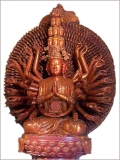
- or -
Look inside!
Chant for Great Compassion
Voicing: SSAA div., and narrator (a cappella)Text: Qiu Jin, Wang Erbei, and traditional 'Great Compassion Mantra'
Language: English & Chinese in transliteration
Duration: 5:30 min.
Premiere: October 25, 2008, Cornell University Chorus (Ithaca, NY)
Commissioned: Cornell University Chorus; Scott Tucker, conductor
Published by: Abbie Betinis Music Co., AB-057-01
Score Sample: PREVIEW THE SCORE (pdf)
LISTEN:
Chant for Great Compassion: mp3, 5:21, 5 MB
Cornell University Glee Club. Scott Tucker, conductor.
Performed live at the Harvard Festival of Women's Choruses, Feb. 2009, and posted here with permission of the Radcliffe Choral Society of Harvard University.
"Chant for Great Compassion" performed by Manitou Singers of Saint Olaf College. Sigrid Johnson conducts. Recorded by Westmark Productions at the North-Central ACDA Convention, March 2010.
PROGRAM NOTE:
 This piece is for anyone in any need or trouble. It is about calling out for strength and courage - as individuals and also on behalf of our generation.
This piece is for anyone in any need or trouble. It is about calling out for strength and courage - as individuals and also on behalf of our generation.The opening melody is inspired by the traditional chant to the goddess Guan Yin (pictured above), known in Buddhism as the Chinese Bodhisattva of Compassion. Guan Yin, whose name means "she who hears the cries of the world," is revered in China, Japan, and Taiwan, and her spiritual ancestor, Avalokitesvara, in Malaysia, Tibet, and Thailand. Guan Yin vowed never to rest until she had freed all sentient beings from reincarnation. To comprehend the needs of so many, her head split into eleven pieces (hence the 11-part chords on page 8 in the score). Suddenly able to hear the myriad cries, she attempted to reach out to everyone who was suffering, but her arms shattered into pieces. She was then given one thousand arms with which to provide aid and relief to those in need.
In China, fishermen pray to Guan Yin to ensure safe voyage. So with the traditional chant, I've juxtaposed the Qiu Jin text, written while she was traveling back to China by boat. Qiu Jin was a Chinese revolutionary, feminist, and writer. An eloquent orator, Qiu spoke out for women's rights: the freedom to marry, freedom of education, and abolishment of bound feet. She was tortured and publicly executed in 1907, at the age of 31.
The Great Compassion Mantra, also known as the Dàbei Zhòu, is an 84-line chant first translated from Sanskrit to Chinese in the seventh century. It is used for protection, purification, and healing. Because the Chinese version has been translated so many times and is spread widely through oral tradition, today the individual words have shed their original meanings. It now exists in many variations in East Asia and around the world, and is said to generate karma - even to the dead - upon its recitation.
This piece was written in response to the earthquake which took the lives of nearly 70,000 people in Sichuan Province in May 2008. But it is said that every recitation of the Great Compassion Mantra generates karma. I encourage singers to envision their own karma recipient(s) as they recite these ancient and beautiful syllables.
- Abbie Betinis
Lines written while traveling by boat
I ride the clouds ten thousand leagues,
I left and now return;
My self alone in the eastern sea,
spring thunder at my side.
I cannot bear to see his map,
and so my face grows pale;
How can I let these rivers and hills
return to kalpa ash?
Cheap wine can never melt away,
the sorrow for my nation;
To save this age, we must rely
on talent beyond the common.
For we will risk this blood that flows
from one hundred thousand skulls -
And thus exert the strength to turn
the cosmos back in place.
- trans. Paul Rouzer
Mirror
A precious mirror is shattered... (etc)
Great Compassion Mantra
1. na mo ho la da nu do la ye ye,
2. na mo o li ye,
3. po lu je di sho bo la ye,
4. pu ti sa do po ye,
5. mo ho sa do po ye,
6. mo ho jia lu ni jia ye,
7. an,
8. sa bo la fa yi,
9. su da nu da sia,
10. na mo si ji li do yi mung o li ye,
11. po lu ji di, sho fo la ling to po,
12. na mo nu la jin cho... (mantra continues for 84 lines)
Lines written while traveling by boat: Used by kind permission of Paul Rouzer. This translation is under copyright, but may be reprinted from this website for use only as related to this musical work (i.e. in concert programs).
Mirror: This translation is under copyright and exerpted here only.
Great Compassion Mantra: This text is in the public domain and may be reprinted freely from this website.
I ride the clouds ten thousand leagues,
I left and now return;
My self alone in the eastern sea,
spring thunder at my side.
I cannot bear to see his map,
and so my face grows pale;
How can I let these rivers and hills
return to kalpa ash?
Cheap wine can never melt away,
the sorrow for my nation;
To save this age, we must rely
on talent beyond the common.
For we will risk this blood that flows
from one hundred thousand skulls -
And thus exert the strength to turn
the cosmos back in place.
- trans. Paul Rouzer
Mirror
A precious mirror is shattered... (etc)
Great Compassion Mantra
1. na mo ho la da nu do la ye ye,
2. na mo o li ye,
3. po lu je di sho bo la ye,
4. pu ti sa do po ye,
5. mo ho sa do po ye,
6. mo ho jia lu ni jia ye,
7. an,
8. sa bo la fa yi,
9. su da nu da sia,
10. na mo si ji li do yi mung o li ye,
11. po lu ji di, sho fo la ling to po,
12. na mo nu la jin cho... (mantra continues for 84 lines)
Lines written while traveling by boat: Used by kind permission of Paul Rouzer. This translation is under copyright, but may be reprinted from this website for use only as related to this musical work (i.e. in concert programs).
Mirror: This translation is under copyright and exerpted here only.
Great Compassion Mantra: This text is in the public domain and may be reprinted freely from this website.
Performed by:
Belle Voix, Illinois State University (Sarah Graham, conductor)
Cantala, Lawrence University (Phillip Swan, conductor)
Cornell University Chorus (Scott Tucker, conductor)
Manitou Singers, St. Olaf College (Sigrid Johnson, conductor)
Oriana Women's Choir, USC Thornton School of Music (Lesley Leighton, conductor)
